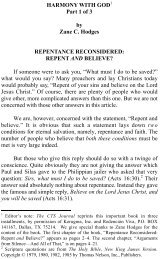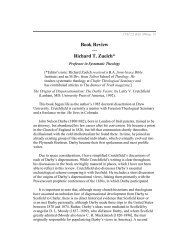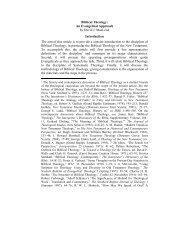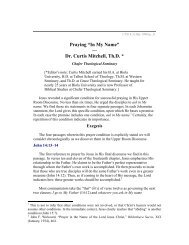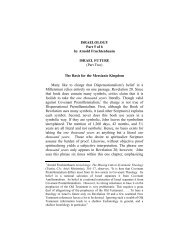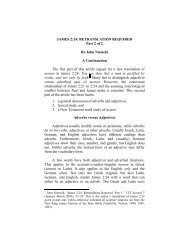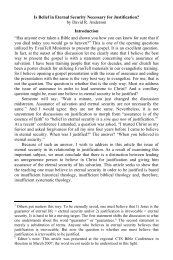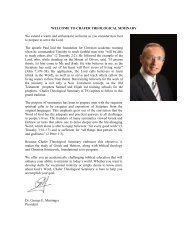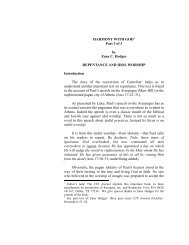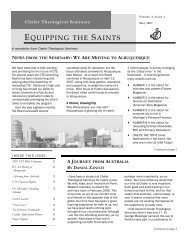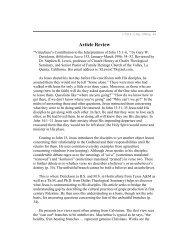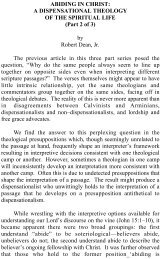Israel's Inheritance: Birthright of the Firstborn Son - Chafer ...
Israel's Inheritance: Birthright of the Firstborn Son - Chafer ...
Israel's Inheritance: Birthright of the Firstborn Son - Chafer ...
Create successful ePaper yourself
Turn your PDF publications into a flip-book with our unique Google optimized e-Paper software.
90 CTS Journal 13 (Spring 2008)<br />
and <strong>the</strong> beginning <strong>of</strong> my vigor:<br />
pre-eminent in authority<br />
and pre-eminent in power.<br />
But, checked like water,<br />
you may not lead!<br />
When you ascended your fa<strong>the</strong>r’s bed,<br />
<strong>the</strong>n you fouled <strong>the</strong> suckler’s couch. (Genesis 49:3–4) 36<br />
Gevirtz’ rendering <strong>of</strong> sh’et as “authority” helps clarify Reuben’s loss <strong>of</strong><br />
leadership that <strong>the</strong> birthright conveyed. So does his understanding <strong>of</strong> pa’chaz<br />
ka’mayim al-totar as “checked like water, you may not lead!”<br />
The reason for Reuben’s loss <strong>of</strong> <strong>the</strong> birthright was an incident <strong>of</strong> filial<br />
impiety, a behavior that reflected on <strong>the</strong> nature <strong>of</strong> his character. In <strong>the</strong> blessing<br />
that Reuben received from Jacob, two contrasting lists <strong>of</strong> characteristics describe<br />
Jacob’s firstborn son. The first list acknowledges Reuben’s position as <strong>the</strong> son<br />
born to <strong>the</strong> birthright. Reuben was Jacob’s “strength” and <strong>the</strong> beginning <strong>of</strong><br />
Jacob’s procreative “vigor.” He was also, by his birthright, “pre-eminent in<br />
authority and pre-eminent in power.” However, <strong>the</strong> passage <strong>the</strong>n develops a<br />
contrasting list <strong>of</strong> attributes that highlights Reuben’s loss <strong>of</strong> <strong>the</strong> birthright.<br />
Reuben was no longer “pre-eminent in power.” He had conducted his life in such<br />
a way that he had to be “checked like water.” He bore <strong>the</strong> consequences <strong>of</strong> his<br />
actions. Jacob told him, “You may not lead.”<br />
It is important to note, however, that Reuben did not lose his inheritance as a<br />
son, but only his inheritance as <strong>the</strong> firstborn. The tribe <strong>of</strong> Reuben received a<br />
portion <strong>of</strong> land, as all <strong>of</strong> Jacob’s sons did, including Ephraim and Manasseh, each<br />
<strong>of</strong> whom received half <strong>of</strong> Joseph’s double portion. Reuben also received a lesser<br />
blessing than <strong>the</strong> son with <strong>the</strong> birthright did. So did all <strong>of</strong> <strong>the</strong> o<strong>the</strong>r sons <strong>of</strong> Jacob<br />
whose inheritance was not <strong>the</strong> birthright. 37<br />
Esau Lost <strong>the</strong> <strong>Birthright</strong><br />
and <strong>the</strong> Special Blessing<br />
The circumstances surrounding Esau’s loss <strong>of</strong> <strong>the</strong> birthright explain that Esau<br />
initiated forfeiture by a deliberate decision to sell his birthright. At <strong>the</strong> time this<br />
occurred, he was hungry to <strong>the</strong> point <strong>of</strong> death, and he acted contrary to <strong>the</strong> way <strong>of</strong><br />
God by relying on a worldly solution ra<strong>the</strong>r than trusting <strong>the</strong> Lord to supply his<br />
need. When he demanded that his bro<strong>the</strong>r give him food, Jacob responded,<br />
“‘First sell me your birthright.’ Esau said, ‘I am about to die; <strong>of</strong> what use is <strong>the</strong><br />
birthright to me?’ Jacob said, ‘Swear to me first.’ So he swore [an oath] to him,<br />
36 Translation by Stanley S. Gevirtz, “The Reprimand <strong>of</strong> Reuben (Gen 49:3),” Journal <strong>of</strong><br />
Near Eastern Studies 30 (April 1971): 98.<br />
37 It is interesting to note that Judah’s blessing also contains characteristics <strong>of</strong> <strong>the</strong><br />
birthright (Gen. 49:8–12). For example, “your fa<strong>the</strong>r’s sons shall bow down before you”<br />
and “<strong>the</strong> scepter shall not depart from Judah.” However, Scripture assigns <strong>the</strong> birthright<br />
to Joseph (1 Chr. 5:1–2).



